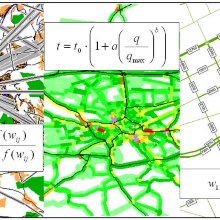Automatically driving cars that take you relaxed to your holiday destination, flowing traffic on German motorways, fewer accidents. These are the ideal ideas of the road traffic of the future. How does an expert assess the future situation? Three questions for Prof. Dr.-Ing. Markus Friedrich, holder of the Chair for Transport Planning and Traffic Engineering at the Institute for Road and Transport Engineering of the Faculty.
How will transport develop in the future?
Forecasts for Baden-Württemberg show a 15 percent increase in passenger traffic between 2010 and 2030. Freight traffic is even expected to grow by 40 percent. The number of passenger cars is growing, we use them more frequently and drive longer distances with them. At the same time, however, we also cycle more and use public transport more often. All in all, this means more vehicles on the roads, more traffic jams and fuller public transport.
Are automated cars the solution to our congestion problem?
There is currently no clear answer to this question, as the rules by which automated cars will drive have not yet been clearly defined. Assuming that cars on the motorway comply with all traffic rules, drive very evenly and cause fewer accidents, the performance of the road will increase and traffic will flow better. The situation is different in the city. The interaction of cyclists, pedestrians and automated cars will be a big challenge and can also lead to lower performance. In principle, driving a car with automated vehicles will become more comfortable because the driving time in the vehicle [as is already the case in public transport] can partly be used for other activities. And if the car gets even better, more people will use it. The efficiency gains from automated vehicles will then be lost again due to more road traffic.
What is your proposed solution?
It will be difficult to solve traffic problems without changing people's behaviour. Traffic only works if we cooperate. For this we need different framework conditions, which the politicians must set. It is not enough to influence behaviour through incentives such as cheaper tickets or the promotion of electric vehicles. If we really want to make a difference, we must demand more money from drivers and invest it in all transport systems. This is a challenging task that politics can only solve across party lines. But the traffic jam at the start of the holiday season will continue in the future. We cannot dimension the roads and organise traffic management in such a way that peak demand in holiday traffic can be handled without congestion. Only "intelligent" traffic participants who adapt their choice to the departure time can help: They can depart either at 3 o'clock in the morning, at 3 o'clock in the afternoon or one day later.
Homepage of the Chair for Transport Planning and Traffic Engineering
| Contact | Prof. Dr.-Ing. Markus Friedrich, Institute for Road and Transport Engineering, Chair for Transport Planning and Traffic Engineering, Pfaffenwaldring 7, D-70569 Stuttgart, +49 711 685-82482, markus.friedrich@isv.uni-stuttgart.de |
|---|


